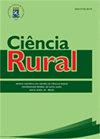从巴西南部地区的生羊奶和奶酪中分离出耐药肠球菌
IF 0.9
4区 农林科学
Q3 AGRONOMY
引用次数: 0
摘要
摘要:肠球菌已被用作监测食物、人类和其他动物抗菌素耐药性的哨兵生物。从这个意义上说,本研究评估了从巴西南部地区的生羊奶和奶酪(殖群型、羊乳酪型和佩科利诺型)中分离的肠球菌的抗菌药物敏感性谱和对红霉素(msrC和ermB)和四环素[tet(M)和/或tet(L)]耐药相关基因的存在。从牛奶(n=80)和奶酪(n=76)样品中分离到156株肠球菌,经MALDI-TOF鉴定。粪肠球菌(50.6%);N =79)是两个样本中最常见的菌种。根据体外药敏试验,肠球菌菌株对人类和兽药中最常用的抗微生物药物不敏感。从牛奶中分离的肠球菌耐多药菌株的频率(53.7%)高于从奶酪中分离的肠球菌(24.2%)。tet(M)基因在四环素不敏感菌株中检出最多。目前的研究首次提供了在巴西南部的生羊奶和奶酪中发现抗微生物不敏感肠球菌的证据。耐药菌株,特别是耐多药菌株,构成了“同一个健康”问题。本文章由计算机程序翻译,如有差异,请以英文原文为准。
Resistant enterococci isolated from raw sheep’s milk and cheeses from South region of Brazil
ABSTRACT: Enterococci have been used as sentinel organisms for monitoring antimicrobial resistance in food, humans, and other animals. In this sense, the present study evaluated the antimicrobial susceptibility profile and the presence of genes associated with resistance to erythromycin (msrC and ermB) and tetracycline [tet(M) and/or tet(L)] in enterococci isolated from raw sheep’s milk and cheeses (colonial, feta-, and pecorino-type) from South region of Brazil. A total of 156 enterococci were isolated from milk (n=80) and cheese (n=76) samples, identified by MALDI-TOF. Enterococcus faecalis (50.6%; n=79) was the most frequent species isolated from both samples. According to in vitro susceptibility tests, enterococci strains were not susceptible to the most commonly antimicrobial agents used in human and veterinary medicine. The frequency of MDR strains in enterococci isolated from milk (53.7%) was higher than those from cheese (24.2%). The tet(M) gene was the most commonly detected among tetracycline not-susceptible strains. The present study provided the first evidence of antimicrobial not-susceptible enterococci in raw sheep’s milk and cheeses in South Brazil. Drug-resistant strains, particularly those that are MDR, constitute a One Health issue.
求助全文
通过发布文献求助,成功后即可免费获取论文全文。
去求助
来源期刊

Ciencia Rural
AGRONOMY-
CiteScore
1.70
自引率
0.00%
发文量
233
审稿时长
2-4 weeks
期刊介绍:
The purpose of Ciência Rural is to publish the results of original research, note and reviews which contribute significantly to knowledge in Agricultural Sciences. Preference will be given to original articles that develop news concepts or experimental approaches and are not merely repositories of scientific data. The decison of acceptance for publication lies with the Editors and is based on the recommendations of Editorial Comission, Area Committee and/ or ad hoc reviewers. The editors and reviewers are external to the institution.
 求助内容:
求助内容: 应助结果提醒方式:
应助结果提醒方式:


